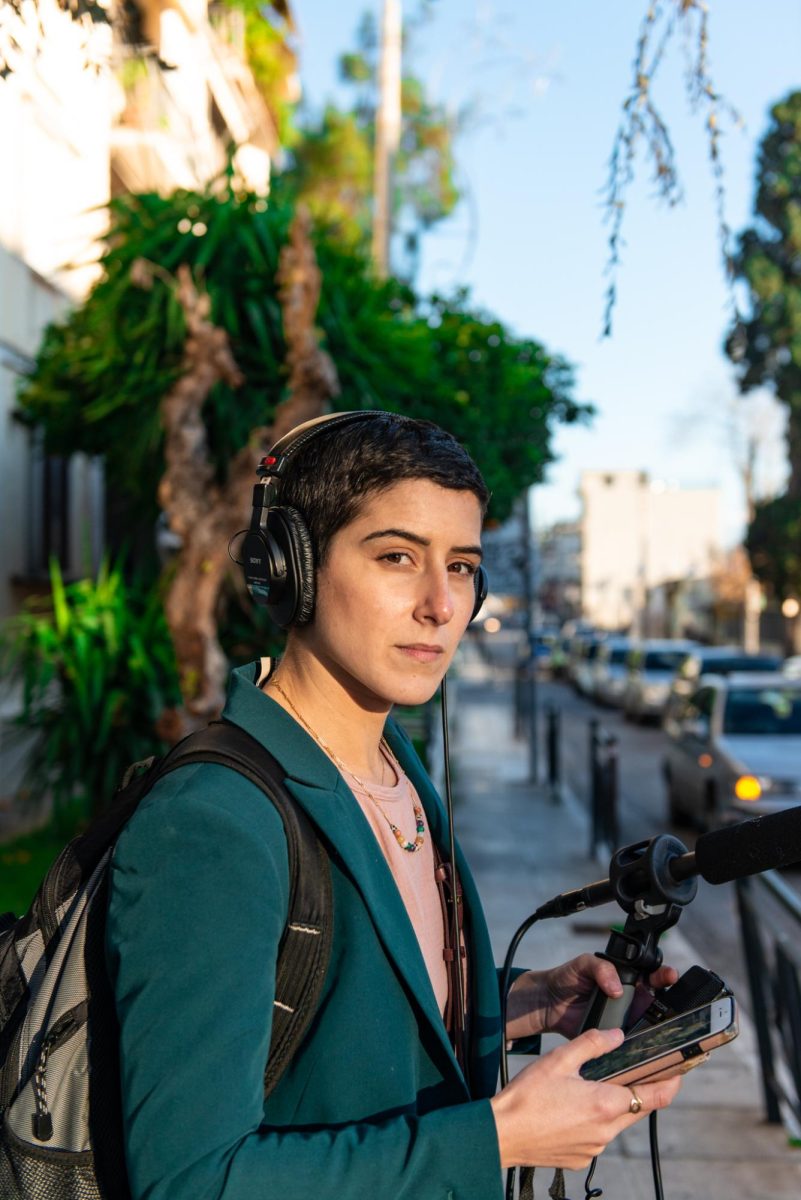In the heavily surveilled refugee camps of Greece, where AI-powered technology tracks every movement, Greek-American journalist Lydia Emmanouilidou has found her calling.
Though she initially set her sights on human rights law, Emmanouilidou discovered journalism’s power to amplify marginalized voices while taking a college radio class in the U.S. — a path that eventually led her back to her birth country of Greece.
She began her career with National Public Radio producing audio journalism, but has since transitioned to freelance work. This shift to freelance has allowed her to focus more deeply on longform investigative reporting centered around human rights, migration and technology. She’s a regular contributor with the Greek investigative newsroom Solomon, one of the very few independent outlets in Greece.
Most recently, she’s dedicated herself to exposing how sophisticated AI surveillance systems at borders and within refugee facilities are reshaping migration experiences, often at the expense of human rights. This work has spanned continents, from the Arizona-Mexico border to the refugee camps of the Greek islands.
Emmanouilidou visited the University of Wisconsin April 14 to deliver a public talk — “Surveillance States: How AI is Reshaping Borders, Refugee Lives and Human Rights.” In her lecture, Emmanouilidou discussed the reporting she did while serving as an inaugural fellow with the Pulitzer Center’s AI Accountability Network.
During her fellowship, Emmanouilidou critically examined the claims made by authorities to justify these surveillance technologies. Governments in the U.S. and European Union have shifted to using this technology in recent years largely because of its ability to make assessments in real time, potentially allowing officials to respond to situations more quickly.
Emmanouilidou explained that officials defend their increasing reliance on AI surveillance — including facial recognition cameras, sensors and monitoring towers — by citing dual benefits of detecting and responding to illegal activities more quickly, while enhancing search and rescue capabilities for people in distress.
But Emmanouilidou’s investigations revealed how these supposedly “humane” technological solutions frequently worsen conditions for the world’s most vulnerable populations. Her reporting has shown a stark contrast between these humanitarian justifications and the technologies’ actual implementation and impact.
“My job has really been trying to understand if this is actually a more humane approach, and what is the impact on people’s human rights in both the U.S. and EU,” Emmanouilidou said.
This gap between intention and reality shows up as a form of deterrence along migration routes. In the case of migration to Greece, Emmanouilidou has increasingly found would-be asylum seekers opting not to make the journey to countries where they can lodge a claim for asylum under both EU and international law.
She says officials often argue surveillance is favored over physical barriers like walls, but that surveillance tools have instead created new forms of discrimination and rights violations against asylum seekers.
Emmanouilidou has also investigated the impact of surveillance in refugee camps funded by the EU, where asylum seekers live while awaiting the processing of their claims. She’s researched the legality of constant surveillance, which sits in a legal gray area, and how it impacts the lived experiences of asylum seekers.
“Giving technology the power to make a lot of these decisions, especially without human oversight, has the potential to supercharge a lot of the inequalities and biases that we already see in our societies,” Emmanouilidou said.
While her recent investigations into AI surveillance highlight the growing intersection of technology and migration, Emmanouilidou’s commitment to human rights journalism spans much further. Her reporting consistently centers those left out of dominant narratives.
“Being a journalist to me means speaking truth to power and giving a megaphone to the people who don’t tend to have a voice in their communities and societies,” Emmanouilidou said. “In my case, it’s asylum seekers and refugees who are, at least in Greece, living on the edges of society where there’s a lot of racism, a lot of xenophobia.”
Emmanouilidou has refined this human-focused reporting throughout her career. Her investigation of the Pylos shipwreck, where approximately 600 asylum seekers lost their lives due to authorities’ delayed response, stands out as a defining example of her journalistic values.
Working with colleagues from across Europe, she helped shine light on how officials’ actions and inactions contributed to the tragedy. For survivors who watched family members and friends drown, speaking with journalists represented one of their few avenues for justice.
After investigating the incident itself, Emmanouilidou has continued follow-up reporting on its impact. This has included reporting stories about survivors’ asylum application status and unfolding responses by authorities. Such reporting reminds readers a story doesn’t end when it’s no longer at the top of the agenda.
Emmanouilidou encourages budding journalists to gain practical experience wherever they can, whether through school newspapers, local publications or internships. “Just do it,” she advises, emphasizing the importance of building clips and connections in a competitive industry. Her own journey from radio to investigative journalism underscores the value of adaptability and persistence.
Now primarily based in Athens, she continues to leverage her bicultural perspective to illuminate the human cost of border technologies — giving voice to those who remain on society’s edges, their stories waiting to be told.



